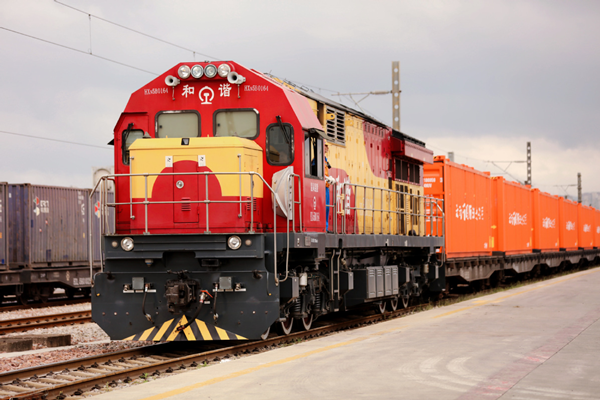
China-Laos freight train departs from Kunming, Yunnan province. [Photo by Yang Zixuan/For chinadaily.com.cn]
The value of international freight handled on the China-Laos Railway has surpassed 10 billion yuan ($1.4 billion) nearly one year after the railway was put into operation, according to Yunnan International Railways Service Trade.
Dec 3 marks the first anniversary of the operation of the high-profile cross-border railway. As of Nov 20, Yunnan International Railways Service Trade has transported more than 10 billion yuan worth in cross-border freight.
According to the company, it operated more than 1,500 inbound and outbound intentional freight train services carrying 1.4 million metric tons of goods.
The monthly volume of cross-border goods handled by the company has grown from less than 30,000 tons to around 200,000 tons.
Twenty-five regions across the country carrying more than 1,200 categories of products operate international train services along the China-Laos Railway. The freight has been sent to more than 10 countries involved in the Belt and Road Initiative such as Laos, Thailand, Myanmar and Vietnam.
The 1,035-kilometer China-Laos Railway runs between Kunming in Southwest China's Yunnan province, and Vientiane, the capital of Laos. The trip takes about 10 hours, with speeds reaching up to 200 km per hour.
Since the Regional Comprehensive Economic Partnership agreement took effect in January, the destinations for international freight via the China-Laos Railway have been expanded to more countries and regions, including Thailand, Malaysia and Cambodia.
"The launch of the railway has not only promoted economic development along the route, but also accelerated construction of the China-Laos Economic Corridor and the community of a shared future between the two sides," said Ma Yong, head of the Institute of Southeast Asian Studies of the Yunnan Academy of Social Sciences.
Thepmoukda Phetsalath, a Laotian who studied at Tongji University in Shanghai, said she usually purchased daily supplies for her family when she was at school, which would take a long time to be shipped from China.
It became more convenient after the railway opened last year.
She is looking forward to the end of the epidemic so she can take her family from Vientiane to China by the railway.